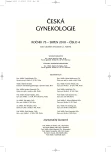-
Medical journals
- Career
Guideline for prevention of RhD alloimmunization in RhD negative women
Authors: M. Lubušký 1,2; M. Procházka 1; O. Šimetka 3; I. Holusková 4
Authors‘ workplace: Porodnicko-gynekologická klinika LF UP a FN Olomouc, přednosta doc. MUDr. Radovan Pilka, Ph. D. 1; Ústav lékařské genetiky a fetální medicíny LF UP a FN Olomouc, přednosta prof. MUDr. Jiří Šantavý, CSc. 2; Porodnicko-gynekologická klinika FN Ostrava, přednosta MUDr. Ondřej Šimetka 3; Transfúzní oddělení FN Olomouc, přednosta MUDr. Dana Galuszková, Ph. D., MBA 4
Published in: Ceska Gynekol 2010; 75(4): 323-324
Overview
Events following which anti-D immunoglobulin should be given to all RhD negative women with no anti-D antibodies: First trimester indications (50 μg) - termination of pregnancy, spontaneous abortion followed by instrumentation, ectopic pregnancy, chorionic villus sampling, partial molar pregnancy; Second and third trimester indications (100 μg) – amniocentesis, cordocentesis, other invasive prenatal diagnostic or therapeutic procedures, spontaneous or induced abortion, intrauterine fetal death, attempt at external cephalic version of a breech presentation, abdominal trauma, obstetric haemorrhage; Antenatal prophylaxis at 28th weeks of gestation (250 μg); Delivery of an RhD positive infant * (100 μg); Minimal dose: before 20 weeks gestation - 50 μg (250 IU), after 20 weeks gestation ** - 100 μg (500 IU); Timing: as soon as possible, but no later than 72 hours after the event. In cases where prevention of RhD alloimmunization is not performed within 72 hours of a potentially sensitising event, it is still reasonable to administer anti-D immunoglobulin (IgG anti-D) within 13 days, and in special cases, administration is still recommended up to a maximum interval of 28 days postpartum.; FMH (fetomaternal haemorrhage) - If the amount of fetal erythrocytes which entered the maternal circulation is quantitatively determined, administration of 10 μg IgG anti-D per 0.5 ml of fetal erythrocytes or 1 ml of whole blood is indicated.
*also if the RhD type of the infant has not been determined or is in doubt, **in conjunction with a test to assess the volume of any fetomaternal hemorrhage.
Sources
1. Ľubušký, M. Prevence RhD aloimunizace. Evidence Based Medicine a přehled doporučených postupů. Postgrad Med, 2010, 12 (2), s. 194-198.
2. Ľubušký, M. Prevence Rh (D) aloimunizace u Rh (D) negativních žen. Prakt Gyn, 2008, 12 (2), s. 100-103.
3. Ľubušký, M., Procházka, M., Krejčová, L., et al. Prevence Rh (D) aloimunizace u Rh (D) negativních žen v těhotenství a po porodu Rh (D) pozitivního dítěte. Čes Gynek, 2006, 71 (3), s. 173-179.
Labels
Paediatric gynaecology Gynaecology and obstetrics Reproduction medicine
Article was published inCzech Gynaecology

2010 Issue 4-
All articles in this issue
- Ethics in neonatal intensive care
- Shoulder dystocia during vaginal delivery
- Analysis of cell free fetal DNA fragmentation rate in pregnant women during the course of gravidit
- DNA analysis on Y chromosomal AZF region deletions in Slovak population
- Guideline for prevention of RhD alloimmunization in RhD negative women
- Pregnant women alloimmunisation of non-RhD erythrocyte antigens: review article
- Perinatal brachial plexus palsy
- Repair of the 3rd and 4th degree obstetric perineal tear
- Severe obstetrical injuries and anal incontinence
-
Rekombinantní aktivovaný faktor VII (rFVIIa) v léčbě závažného poporodního krvácení
Data z registru UniSeven v České republice -
Trombotická trombocytopenická purpura v těhotenství
Kazuistika - Uterine rupture in pregnancy - case study
- Local sperm antibodies and general levels of immunoglobulins in ovulatory cervical mucus
- Measurement of bone mineral density by heel ultrasound and forearm DXA in clinical practice
- Complications of radical oncogynecological operations
- Process of women’s reproductive ageing – causes, evaluation and possible clinical usage
- Czech Gynaecology
- Journal archive
- Current issue
- Online only
- About the journal
Most read in this issue- Shoulder dystocia during vaginal delivery
- Repair of the 3rd and 4th degree obstetric perineal tear
- Perinatal brachial plexus palsy
- Complications of radical oncogynecological operations
Login#ADS_BOTTOM_SCRIPTS#Forgotten passwordEnter the email address that you registered with. We will send you instructions on how to set a new password.
- Career

